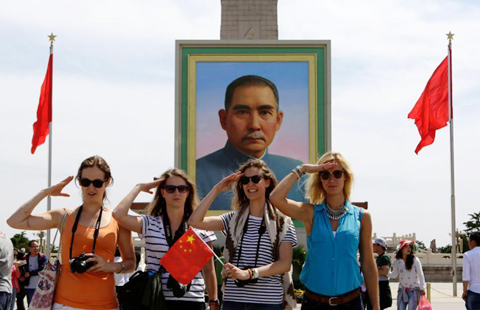Commodities-boom impact a problem: report
Updated: 2015-05-04 03:46
By PAUL WELITZKIN in New York(China Daily Latin America)
|
||||||||
Chinese investments have helped to propel a commodity boom in Latin American countries, but the region needs to work with China to lessen the environmental impact of some of the investments, according to a recently released report.
Kevin Gallagher, one of the authors ofChina in Latin America: Lessons for South-South Cooperation and Sustainable Development, said Chinese investment in Latin America has been focused on the petroleum, mineral extraction and agricultural sectors which are the "bread and butter of the Latin American economy".
China's investment and development of Latin America's resources have led to impressive economic advances in the region but also cause some environmental concerns, said Gallagher, co-director of the Global Economic Governance Initiative at the Frederick S. Pardee School of Global Studies at Boston University.
"Latin American governments have environmental laws on the books. However, in many cases they turn a blind eye because of the infusion of capital," Gallagher said in an interview.
"It wouldn't be fair to blame China entirely. There are several examples of where China has been environmentally responsible in developing the resources," he added.
One project where China has been lauded for its environmental work is the Toromocho copper mine in Peru that was developed by the Chinalco Mining Corp. The mine employs about 2,500 workers and helped to create an additional 7,500 jobs. Chinalco built a wastewater treatment plant and relocated the town of Morococha to a new site.
China is expected to help mitigate social and environmental impacts of its global activities to maintain good relations with host countries and reduce the potential risks associated with overseas investment.
"I think it is in China's best interest to embrace a socially and environmentally responsible policy. If they want to continue to develop the resources in the future, the people will be more supportive if they see environmentally-sound practices being used in previous projects," said Gallagher.
Hu Tao, China program director for the World Wildlife Fund in Washington, said he believes that Chinese companies need to improve their image in Latin America and other regions of the world where they have operations. "They should have a better CSR (corporate and social responsibility) strategy that would not only help them have better relations in host countries but also improve their (corporate) performance," he told China Daily.
Tao said the Chinese government should also strive to upgrade its image in Latin America. "The Chinese government can have better regulations for all companies operating overseas," he said.
Tao said the China Mining Association, a think tank of the National Development and Reform Commission and the WWF are working together to develop mining guidelines for Chinese companies operating in foreign countries.
Tao also believes that non-governmental organizations can play a bigger role. "More Chinese environmental NGOs should expand what they are doing from Myanmar and Cambodia to Latin America," he said.
In Myanmar, a Chinese NGO is developing a project to lift residents out of poverty and in Cambodia an NGO is working to evaluate the impact of Chinese industrial parks in the country.
"I also think it is important for the Chinese media to report more on the environmental and social issues that Chinese companies and NGOs are confronting," Tao said.
paulwelitzkin@chinadailyusa.com

 Historical photos of 56 nations in China (Part I)
Historical photos of 56 nations in China (Part I)
 World No.1 Ma wins first men's singles world championship
World No.1 Ma wins first men's singles world championship
 Ten photos you don't wanna miss during May Day holiday
Ten photos you don't wanna miss during May Day holiday
 The world in photos: April 27 - May 3
The world in photos: April 27 - May 3
 Fans dressed up to celebrate 'Star Wars Day' in Budapest
Fans dressed up to celebrate 'Star Wars Day' in Budapest
 China pavilion opens at Expo Milano 2015
China pavilion opens at Expo Milano 2015 New exhibition by Fondazione Prada offers new perspective on originality and imitation
New exhibition by Fondazione Prada offers new perspective on originality and imitation
 Mayweather beats Pacquiao by unanimous decision
Mayweather beats Pacquiao by unanimous decision
Most Viewed
Editor's Picks

|

|

|

|

|

|
Today's Top News
China protests
US blacklisting in religious freedom
China becomes top source of immigrants to United States
Los Angeles protesters confront Abe face to face
Language contest wows judges
Arrest warrants issued in birthing center cases
Baltimore mayor lifts curfew 6 days after riots
More speculation in China's market as it's new
Consul general praises Beijing university to alumni
US Weekly

|

|






